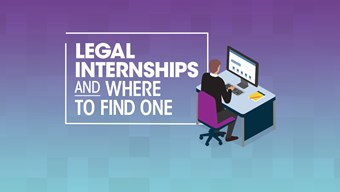July is Disability Pride Month and here, at The University of Law, we’re delighted to support a thriving community of students and employees as they manage various conditions. To highlight this important month, current student Drew Collins (also known as The Legal Zebra), who is living with Hypermobile Ehler’s Danlos Syndrome, tells us about studying with a hidden illness and gives her advice for fellow disabled students.
By Cara Fielder. Published 01 July 2024.
I have Hypermobile Ehler’s Danlos Syndrome (HEDs). This is a connective tissue disorder which is accompanied by various symptoms such as extreme hypermobility, chronic pain, dysautonomia and several other conditions. I first began noticing symptoms when I was around 10 years old, and I was initially diagnosed with pronation of the ankles. When my symptoms began to worsen and develop, I was finally diagnosed with HEDs after multiple years of self-advocacy at around 14 years old.
I was inspired to study law by my father, who is also disabled, suffering from a chronic pain disorder. He studied law as a mature student and began pursuing a legal career before, unfortunately, being unable to carry on working. As I approached college, he encouraged me to study law as a new subject and I even had the same lecturer as he had when he was a student. My passion for law continued growing from there.
Due to the unpredictability of my condition, I am still in the process of figuring out where life may take me career wise. Initially, and if my body permits, I would like to obtain a training contract and begin practicing as a solicitor in the future.
As HEDs effects all connective tissue in the body, my joints are very hypermobile which makes activity and tasks more difficult for me to complete in daily life. I also have chronic daily pain which can be accompanied by ‘flare ups’ of pain in groups of joints. This is extremely painful and can last anywhere from 30 minutes to multiple hours and there is not much that can be done to ease these symptoms as pain medication does not help in any way. Additionally, I suffer from a lot of brain fog and postural dizziness which can be frustrating as I often forget things short term, and often get bouts of dizziness throughout the day. Most significantly, I suffer and am prone to sublaxations and dislocations of my joints which are partial and full dislocations. These can be extremely painful and frustrating but are however, a common symptom of fellow Zebras suffering from HED’s.
My University of Law Inclusion Plan (ULIP) provides me with extra time and PC access during my exams, which has been extremely helpful. This is because during exams, I have trouble sitting for long periods of time, so extra time allows me to take breaks and remain as comfortable as possible. Similarly, PC access allows me to type my exam submissions which is a less tiring method for my hands than handwriting submissions would be.
Both within university and outside of university I think it is difficult suffering from a hidden disability just for that exact reason, it is hidden. On days where I don’t use any mobility or disability aids, I look completely ‘normal’. It is difficult for others to understand or take me seriously when I say that I am in chronic pain or suffering from certain symptoms when they can’t physically see it. Unfortunately, in daily life, that can bring some judgement, criticism and suspicion as to my condition, with individuals believing my condition is ‘made up’. Advocating against these predisposed stereotypes is a big challenge to overcome, however, I believe having a disability at university, whether seen or unseen, is particularly difficult regardless of the circumstances.
Disability Pride Month means a recognition of the struggles and empowerment which come with having a disability and sharing that with the world. This is in hopes of breaking taboos and stereotypes and encouraging equality and empathy.
I think the most notable support at The University of Law for me is having a personal disability advisor. Just knowing that someone is there to support you through university which suffering from my condition really is wholesome and encouraging.
I think many students don’t declare their disabilities because of taboos and stereotypes. But also, I think this is down to disabled individuals maybe not wanting to be seen as ‘different’ or not thinking there truly is any support available. I would advise them to really take that leap of faith and trust in your university to disclose your disability, because the support you could receive really makes a difference to your life, especially in regard to exams.
My advice for anyone wanting to be a disability ally is to be empathetic and truly listen to what students with disabilities have to say. Equally, be curious. I know a speak for a lot of other disabled individuals when I say that I would rather others be curious and ask a lot of questions to enhance their understanding of my condition than walk on eggshells around me, which can unfortunately feel more isolating.
To anyone considering studying, be open with your disability. Discuss your condition in detail with the Disability Team so they can best help you and to ensure they can support your needs throughout your time at The University of Law.
Discover more about the way we support you during your studies.


